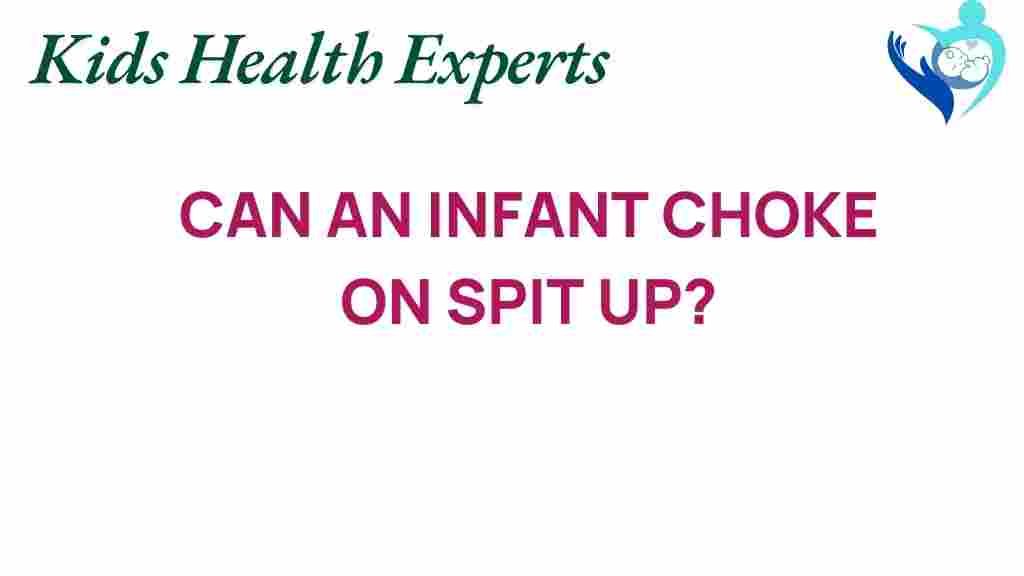Infant Safety: The Chilling Truth About Spit-Up and Choking Hazards
As new parents, ensuring the safety of your little one is a top priority. One common concern that many caregivers face is the question of whether infants can choke on their own spit-up. Understanding the risks associated with spit-up and the potential choking hazards it poses is crucial for maintaining infant health and providing effective baby care. This article aims to provide comprehensive parenting advice, pediatric guidance, and emergency response tips to help you navigate this important topic.
Understanding Spit-Up and Reflux in Infants
Spit-up is a common occurrence in infants, particularly in the first few months of life. It usually happens when a baby regurgitates milk or formula after feeding. This can be attributed to a range of factors, including:
- Immature digestive systems
- Overfeeding
- Swallowing air during feeding
- Gastroesophageal reflux (GER)
Reflux, specifically gastroesophageal reflux disease (GERD), can lead to more significant issues and discomfort for your baby. While spit-up is generally harmless, it can sometimes lead to concerns about choking, especially for parents who are unaware of the actual risks.
Can Infants Choke on Their Own Spit-Up?
The short answer is yes, but the risk is relatively low. Babies have a natural gag reflex that often prevents them from choking on spit-up. However, there are circumstances where spit-up can pose a choking hazard, such as:
- If a baby is lying flat on their back
- If they are sleeping deeply
- If there is a significant volume of spit-up
Understanding these situations can help you take preventive measures to ensure your infant’s safety.
Preventing Choking Hazards: Tips for Parents
To protect your infant from choking hazards related to spit-up, consider the following strategies:
1. Positioning During and After Feeding
Proper positioning during feeding can greatly reduce the risk of spit-up and choking:
- Hold your baby in an upright position while feeding.
- After feeding, keep them upright for at least 30 minutes.
- Avoid placing your baby flat on their back immediately after feeding.
2. Monitor Feeding Practices
Be mindful of how much and how quickly your infant is feeding:
- Feed smaller amounts more frequently to avoid overfeeding.
- Take breaks during feedings to allow your baby to burp.
- Choose bottles designed to minimize air intake.
3. Create a Safe Sleep Environment
When it comes to sleep, the environment plays a crucial role in infant safety:
- Always place your baby on their back to sleep, even if they spit up.
- Use a firm mattress and avoid soft bedding that could pose a suffocation risk.
- Consider elevating the head of the crib slightly if your pediatrician approves.
4. Recognize Signs of Distress
Being aware of your baby’s cues can help you respond quickly in case of choking:
- Watch for signs of coughing, gagging, or difficulty breathing.
- Learn infant CPR and emergency response techniques.
- Keep your pediatrician’s contact information readily available.
5. Consult Your Pediatrician
If you have concerns about your infant’s spit-up or reflux, consult your pediatrician for personalized advice. They can provide guidance tailored to your baby’s specific health needs and help you understand the difference between normal spit-up and concerning symptoms.
Emergency Response: What to Do If Your Infant Chokes
In the unfortunate event that your infant does choke, knowing how to respond can be life-saving:
Step-by-Step Emergency Response
- Stay Calm: Your calm demeanor will help soothe your baby and enable you to think clearly.
- Assess the Situation: Determine if your baby is coughing, gagging, or unable to breathe.
- Encourage Coughing: If your baby is coughing, allow them to continue to cough to expel the blockage.
- Perform Back Blows: If the baby is not breathing, place them face down on your forearm and deliver five firm back blows between the shoulder blades.
- Perform Chest Thrusts: If back blows do not work, flip the baby onto their back and perform five chest thrusts (similar to CPR).
- Call for Help: If the baby is still not breathing, call emergency services immediately.
Remember to take an infant CPR class to be better prepared for any emergencies.
Troubleshooting Common Concerns
As a parent, you may encounter various concerns related to spit-up and choking. Here are some common issues and how to address them:
1. Excessive Spit-Up
If your infant is spitting up excessively, consult your pediatrician to rule out any underlying medical conditions such as GERD.
2. Spit-Up with Blood
Any presence of blood in spit-up is a serious concern. Seek immediate medical attention if you notice this symptom.
3. Difficulty Breathing
If your baby appears to have difficulty breathing or is unusually lethargic after spitting up, contact your healthcare provider immediately.
4. Persistent Coughing or Gagging
If your infant frequently coughs or gags after feeding, discuss this with your pediatrician, as it may indicate reflux or another issue.
Conclusion: Prioritizing Infant Safety
Understanding the risks associated with spit-up and choking hazards is essential for every parent. By implementing safe feeding practices, creating a secure sleep environment, and being prepared to respond in emergencies, you can significantly reduce the risk of choking while ensuring your baby’s health and well-being.
For more information on infant safety and health, consult your pediatrician or visit reputable resources such as the American Academy of Pediatrics for guidance.
By being informed and proactive, you can enjoy the precious moments of parenting while keeping your infant safe and healthy.
This article is in the category Care and created by KidsHealthExperts Team

1 thought on “The Chilling Truth: Can Infants Choke on Their Own Spit-Up?”